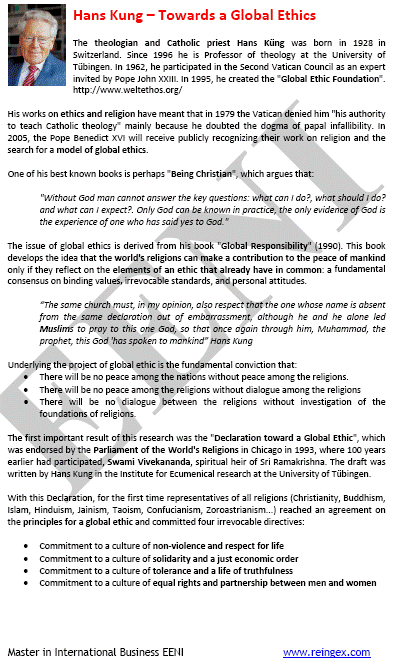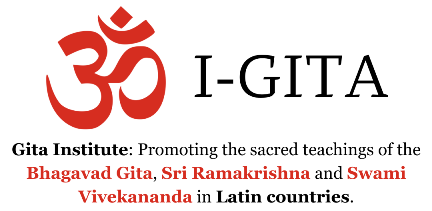Hans Kung - Towards a Global Ethics
Global Ethics: Non-Violence (Ahimsa) Tolerance (Hans Kung)
The theologian and Catholic priest Hans Küng was born in 1928 in Switzerland.
Underlying the project of a global ethic is the fundamental conviction that:
“There will be no Peace among nations without peace among religions.
... Peace among religions without dialogue among religions
... The dialogue between religions without investigation of foundations of religions.” Hans Kung
The first important result of this research was the “Declaration Toward a Global Ethic,” which was endorsed by the Parliament of Religions of the World in Chicago in 1993, where hundred years earlier had participated, Swami Vivekananda, the spiritual heir of Sri Ramakrishna.
- Hans Kung (theologian and Catholic priest)
- Hans Kung's proposal on principles of a global ethic
Hans Kung - Global Ethics

Religions and Global Business -
Religious diversity

The Subject “Hans Kung's proposal on principles of a global ethic” is included within the curriculum of the following academic programs at EENI Global Business School:

Doctorate: Ethics, Religions & Business.


- Since 1996, he is a Professor of Theology at the University of Tübingen
- In 1962, he participated at the Second Vatican Council as an expert invited by Pope John XXIII
- In 1995, he created the “Global Ethic Foundation”
- His works on ethics and religion have meant that in 1979 the Vatican denied him “his authority to teach Catholic theology” mainly because he doubted the dogma of Papal Infallibility
- In 2005, Pope Benedict XVI received publicly recognizing their work on religion and research for a Model of Global Ethics
- The issue of Global Ethics is derived from his book “Global Responsibility” (1990). This book develops the idea that the World's Religions can contribute to peace of humanity
“Only if they reflect on the elements of an ethic that already have in common: a fundamental consensus on binding values, irrevocable standards, and personal attitudes.” Hans Kung
With this Declaration, for first time representatives of all religions (Christianity, Buddhism, Islam, Hinduism, Jainism, Taoism, Confucianism, and Zoroastrianism) reached an agreement on principles for a global ethic and committed four irrevocable directives: commitment to a culture of
- Non-Violence and respect for life
- Solidarity and a just economic order
- Tolerance and a life of truthfulness
- Equal rights and partnership between men and women
The project on “Ethics, Religion, and Business” directed by Pedro Nonell has a different approach based on two principles (Harmony of Religions and Ahimsa - Non-Violence), but the goals are the same: The search for a Model of Global Ethics.


(c) EENI Global Business School (1995-2025)
Top of this page









 WhatsApp
WhatsApp
 or
or 


